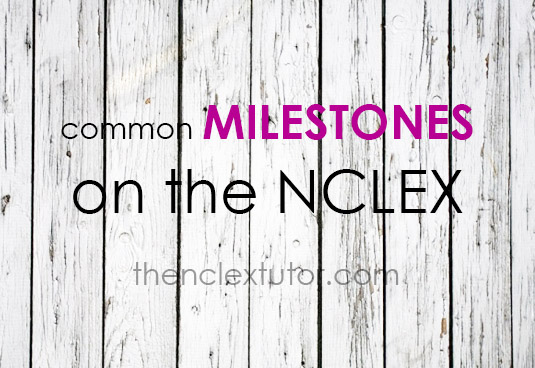Remembering the milestones is at the top of the list for the “Most Annoying” NCLEX questions. They are annoying because you feel like you are memorizing most of them.

My students tell me they love this list better than anything they can find in a book. I don’t include all the milestones, just the ones that are the most common and therefore, most likely to get asked about. Here are the milestones you should definitely remember.
Fetal Development Milestones
- week 12: can determine sex of baby
- week 10-12: heartbeat of baby is detected by doppler
- week 20: heartbeat of baby is detected by fetoscope
- week 28: if baby is born, will be able to breathe on own
Infant Milestones
- 2-3 months: turns head side to side
- 4-5 months: grasp, switch and roll
- 6-7 months: sit at 6 and waves bye-bye
- 8-9 months: stand straight at 8
- 10-11 months: belly to butt (phrase has 10 letters)
- 12-13 months: twelve and up, drink from a cup
- 14-15 months: walks alone and away from mom
Foods
- 4-6 months: start solid foods like rice cereal
- 1-2 years old: can give whole milk
- 3 years old and younger: no small, hard foods due to aspiration
- no honey for the first year due to risk of botulism
Birth Weight
- weight doubles at 5 to 6 months
- triples at 12 months
Fontanels
- posterior fontanel closes by 2nd month (smaller one)
- anterior fontanel closes by 12 – 18 months (bigger one)
Separation Anxiety
- starts at 6 months
- peaks at 10 -18 months
- starts to decrease by 2 – 4 years old
Object Permanence
- object permanence is when the baby knows the object exists even if it is out of sight
- baby starts to realize this at 8 – 9 months
Toys and Playing
- infant: musical mobile
- 3 – 6 months: rattles, stuffed animal, large picture book
- 6 – 9 months: peek-a-boo, large plastic rings, ball
- 9 – 12 months: building blocks
- Work more on gross motor skills
- 1 – 3 years old: toddler – wagon, push-pull toy, large ball
- parallel play – plays next to others 3 – 6 years old: preschooler (imaginative play)- dress-up, puppets, playdoh, large trucks, coloring books/crayons, chalk, large puzzles, dancing, jumping, swinging
- cooperative play – plays with others
- 1 – 3 years old: toddler – wagon, push-pull toy, large ball
- Work more on fine motor skills
- 6 – 12 years old: school age – collecting things, very creative and building, competitive with winners and losers
- 12 – 20 years old: hanging out with friends
Toilet Training
- 1 – 3 years: toilet training starts
- needs to understand about reason to use potty, good sphincter control, walking well, pull pants up and down
Adolescence
- first period: average age is 12 ½ years old
- need extra sleep due to growth spurts
- higher risk for accidents due to risk-taking behavior / teach about preventing STIs
Other Common Milestones (based on the other theories):
- 0 – 1 year: concerned with self
-
2
– 4 years: don’t have a great understanding of right and wrong;
they obey rules to avoid being punished or they obey rules because
they want the reward
- provide simple explanations of unacceptable behavior, praise them and use distraction
- give timeouts for discipline: ex: 2 minute timeout for 2 years old
- 4 – 7 years old: likes rules
- 7 – 10 years old: starts to conform in order to be liked by others
- 10 -12 years old: has more concern for society and what is best for all; can think abstractly and logically
Do you have any good sayings or mnemonics for remembering milestones? Tell me about them!
Find it helpful? Please share it!
Just what I needed.
Thanks!
You’re welcome! If you like how that’s organized, then you’d probably really like the book I wrote: thenclextutor.com/nuggetpages
You can “look inside” to see how the content is organized.
This was great and simplistic.!!!!!!
Thank you and I’m glad you found it helpful! Keeping it simple is always my goal.